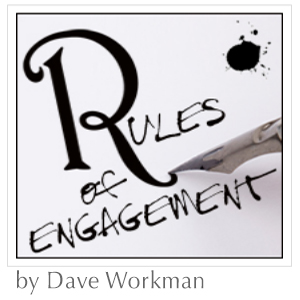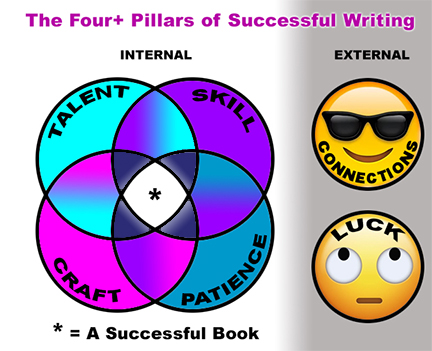 A notebook for fiction writers and aspiring novelists. One editor’s perspective.
A notebook for fiction writers and aspiring novelists. One editor’s perspective.
• Next post • Previous post • Index
More Common Obstacles that Novelists Commonly Confront.
•
You may be #1: A Serial Story Starter. Starting a novel is a lot like a first date. The possibilities feel boundless, and our expectations are through the roof. Filled with excitement and confidence—even if our perceived ending (or second chapter, for that matter) remains a bit nebulous—some of us can easily write a fabulous ten or 20 pages with little effort.•
Or, you may be #2: A Panster. Thirty years ago, the term panster did not exist—or else did so clandestinely and had yet to evolve into the literary limelight. The term (should you have recently awoken from a coma) defines those freestyle writers among us who write without any perceived forethought or planning or, more often than not, without a clue as to how one’s story might end. Personally, I love starting a novel with wild abandon, sometimes with only a vague or fuzzy notion of my characters’ personalities/motivations and with a single inciting incident in mind. But within 50-or-so pages I typically realize that I’m confronting too many options to wing it any further. At that point I begin to outline my next few scenes and/or chapters. And while I shall refrain from mentioning the virtues of outlining yet again, if you’ve missed my last few dozen posts, HERE‘s a quick reminder. Do realize that outlining doesn’t necessarily mean religiously, unerringly, bullet-pointing an entire novel from cover to cover before you begin writing. Outlining can be as brief and as vague as a few jotted lines that jog your creativity or lead you out of a jam or dead end. For me, outlining is also a sort of reality check (can I do this scene differently? Can I do it better?) before I proceed into uncharted waters. If you are a panster and decide outlining doesn’t work for you, at least you’ve eliminated the process as a potentially valuable tool. So it’s worth consideration.•
Or you may be #3: A Daydreamer. (All dressed up and nowhere to go.) We’re all daydreamers, we fiction writers. Ain’t nothing wrong with daydreaming—what’s a novel after all, but a daydream we write down, embellish, and ultimately complete? I’ve known a good many writers who concoct rather brilliant ideas, even come up with a functional synopsis or summary…and then perhaps finish a scene or two, a chapter or two, before realizing that Writing is hard. (Refer again to: A Few Common Obstacles.) For most creative people, coming up with boffo story ideas is by far the easy part. The difficulty comes over the next several months, or years, attempting to complete in exacting detail the story you’ve envisioned. It’s not for the feint of heart. Or for the incredibly busy.•
•
Or you may be#5: A Closeted Screenwriter. The novel isn’t the only game in town. If you love writing dialogue but hate elaborate scene-setting or nuanced character-building, consider writing a screenplay. A 90-120 page script (translating into a 90-120 minute cinematic runtime), can be completed in a fraction of the time and (imho) far easier to conceive and complete. Ninety percent of a screenplay (more or less) will be dedicated to dialogue. Deep thinking, indecision, unspoken secrets — all are non-existent, unless exposed through dialogue, or VO, or a few dramatically visualized, emotional cues. Scene-setting is reduced to a few lines of often vague information, and yet sufficient for a director to interpret. Thus: EXTERIOR. SUMMER. DAY. SOMEWHERE IN NEBRASKA. A FARMHOUSE SITS ON A DISTANT HILLSIDE. UNSEEN COWS ‘MOO’ IN THE DISTANCE. JAKE and MARY SUE walk hand-in-hand down a dirt road toward a tractor shed, where JAKE has parked his old ’67 Flatbed Ford.MARY SUE (staring cautiously behind them)
Daddy says I’m not supposed to see you any more. He says if he catches us together he’ll throttle me and kill you.
JAKE (smirking)
MARY SUE
JAKE (motioning toward the Ford)
Then run away with me, Mary Sue. Today. Right now. We always talked about goin’ off to California. Now’s our chance. Let’s leave this shit-hole, and your no-good excuse of a father, in our dust. No more milkin’ cows. No more takin’ crap from a man who’s far more a drunk than a daddy.MARY SUE (frowning)
I can’t just up an’ run, Jake. I can’t leave little Billy alone with that man. Not for a single night. I need to stay an’ protect my baby brother. You know that. In a screenplay, you’re choreographing actions (such as driving away) and emotions (fearing a drunk daddy, protecting a vulnerable little boy) largely through dialogue. In a screenplay, your options of revelation to an audience are simple. You’re either depicting visual actions, or else revealing necessary information through relevant dialogue. It’s up to the writer to convey emotion as simply, as precisely, as possible. One can allude to visual cues (Perhaps we see Mary Sue frowning at Jake’s suggestion to leave, for instance.) But even that nuanced gesture or expression is ultimately in the hands of the director, working in tandem with the actor, to fine-tune those visual cues, based on the blue-print (script) that you’ve provided. Nor is there need to transmit unnecessarily detailed info to your audience. Let’s look at the aforementioned Nebraska farmhouse for example. Unless that particular structure/color/location is somehow specifically relevant to the plot, it’s simply labeled (in your script) “a farmhouse.” Whether it’s well kept or dilapidated, big or small, white or brown or a pleasant Robin’s Egg Blue, if its description isn’t plot-specific, it’s irrelevant in your script. A set director or location scout will run those potential decisions past the film’s director. Realize that a script is simply a tool, one of many foundational elements necessary in producing a film. And you, the writer, are simply the “tool maker.” (And a well-paid toolmaker, should your script make it into a film’s production stage.) But you’re not the end-user. The director wears that crown. And seldom, if ever, will a script be followed verbatim. Some scripts, by the end of a film shoot, may even be unrecognizable by the writer. So just be aware that a great many story-making decisions — those exclusively decided by a novelist (although somewhat massaged by a publisher) — are now under complete control by a director (or a cinematographer or a set-designer). You’re merely providing those folks with a viable roadmap. A director may dramatically alter your story, change your vision in numerous ways, even hire various script-doctors and/or other writers to fulfill certain needs. It’s just part of the process. Film development is a team endeavor. Once the script is complete, a screenwriter simply moves on to another project. Certainly, pro’s and con’s exist, and should be examined in far more detail than I could ever explain here. (Nor have I ever completed a screenplay, so there’s that!) I highly recommend William Goldman’s Adventures of the Screen Trade. (Goldman wrote Butch Cassidy and the Sundance Kid, Marathon Man, The Princess Bride, All the President’s Men…so the guy knew what he was doing.) Also check out Blake Snyder’s Save The Cat. Writing, selling and marketing a script is a whole ‘nother beast, and in a marketplace far different than traditional book publishing. I have a friend who’s optioned a single script three times. When a screenplay is optioned, typically by a production company or lone producer, your story is in limbo. Meaning that your script hasn’t—yet—been outright purchased, but is being held in escrow as that producer’s exclusive property. No other production company or studio can touch it for a fixed amount time (sometimes a year or more), until that producer either commits to film it or releases all rights back to you. You are, however, paid a stipend (typically 4-figures, occasionally more) for the luxury of waiting—although there’s no guarantee that a producer will find sufficient money and actually begin production. (If so, you’ll sign a contract and be bumped into a 5- or 6-figure compensation.) And finding yourself with an optioned screenplay is certainly better than having no interest at all.) If your script is ultimately rejected, you’re free to put it back on the market. Some scripts will spend a decade or more, bouncing between various production companies, waiting to find the right fit.•
Not ready to give up on your current manuscript? Not ready to give up the prospect of being a novelist? One final suggestion. Put the manuscript away for at least two weeks. Maybe a month or more. Allow yourself sufficient time to clear your head, or to formulate new ideas (write a short story or two, perhaps?) and then approach your your manuscript with a newfound thrill and a fresh perspective. Sometimes, that down time can work wonders.• Next post • Previous post • Index .

